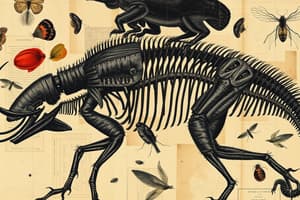Podcast
Questions and Answers
What is the definition of 'Domain'?
What is the definition of 'Domain'?
- A group of closely related species.
- A classification for organisms that can breed.
- The broadest taxonomic category; each domain has one or more kingdoms. (correct)
- A large taxonomic group consisting of closely related classes.
What is the Kingdom classification of corn?
What is the Kingdom classification of corn?
Plantae
What is the Phylum classification of corn?
What is the Phylum classification of corn?
Anthophyta
What is the Class classification of corn?
What is the Class classification of corn?
What is the Family classification of corn?
What is the Family classification of corn?
What is the Genus classification of corn?
What is the Genus classification of corn?
What is the Species classification of corn?
What is the Species classification of corn?
Which domain do all plants, including corn, belong to?
Which domain do all plants, including corn, belong to?
Corn belongs to the Kingdom Fungi.
Corn belongs to the Kingdom Fungi.
What characterizes Monocotyledones?
What characterizes Monocotyledones?
What type of organism falls under Plantae?
What type of organism falls under Plantae?
What is a characteristic of organisms in the domain Eukarya?
What is a characteristic of organisms in the domain Eukarya?
Match the following classifications to their definitions:
Match the following classifications to their definitions:
What are the defining characteristics of the Family Poaceae?
What are the defining characteristics of the Family Poaceae?
Flashcards are hidden until you start studying
Study Notes
Taxonomic Hierarchy
- Domain: Broadest taxonomic category, consisting of one or more kingdoms. Corn belongs to the Eukarya domain, which includes organisms with nuclei and membrane-bound organelles.
- Kingdom: Large group containing closely related phyla. Corn is classified under the Plantae kingdom, which encompasses terrestrial, multicellular, photosynthetic organisms.
- Phylum: Groups of closely related classes. Corn fits into the Anthophyta phylum, characterized by flowering plants.
- Class: Groups of similar orders. Corn is categorized under Monocotyledones, which are flowering plants with one seed leaf and flower parts typically in threes.
- Order: Groups that contain similar families. The order for corn is Commelinales, consisting of monocots with fewer flower parts and elongated leaves.
- Family: Groups of similar genera. Corn belongs to the Poaceae family, which contains grasses characterized by hollow stems and grain-producing fruits.
- Genus: A group of similar species. Corn is placed in the genus Zea, which includes tall annual grasses with distinct male and female flowers.
- Species: Groups of organisms that can breed and produce fertile offspring. The species of corn is identified as Zea mays or Zea maize.
Corn Classification
- Eukarya: The domain of corn, indicating it has complex cells with a nucleus.
- Plantae: The kingdom of corn, highlighting its nature as a photosynthetic organism.
- Anthophyta: The phylum of corn, noting that it is a flowering plant.
- Monocotyledones: Indicates that corn has one seed leaf and flower parts in groups of three.
- Commelinales: Reflects corn's specific order, which has unique flower and leaf characteristics.
- Poaceae: Classification of corn within the grass family, known for its grain production.
- Zea: The genus signifying that corn has specific features like separate male and female flowers.
- Zea mays/Zea maize: The species indicating the common name of corn.
Specific Characteristics
- Eukarya: Distinctive for organisms with nuclear structures and membrane-bound organelles.
- Plantae: Emphasizes the multicellular and photosynthetic traits of corn.
- Monocotyledones: Highlights features such as one seed leaf and flower arrangements in threes.
- Commelinales: Defines a group with minimal flower parts and elongated leaves.
- Zea: Describes corn’s structure as tall annual grass with separated reproductive structures.
- Zea mays/Zea maize: The scientific and common name for corn, ensuring clarity in identification.
- Poaceae: Represents grasses with hollow stems, facilitating the understanding of its physical structure.
These notes provide a comprehensive overview of the classification of corn within the biological taxonomy, outlining each level from domain to species.
Studying That Suits You
Use AI to generate personalized quizzes and flashcards to suit your learning preferences.




